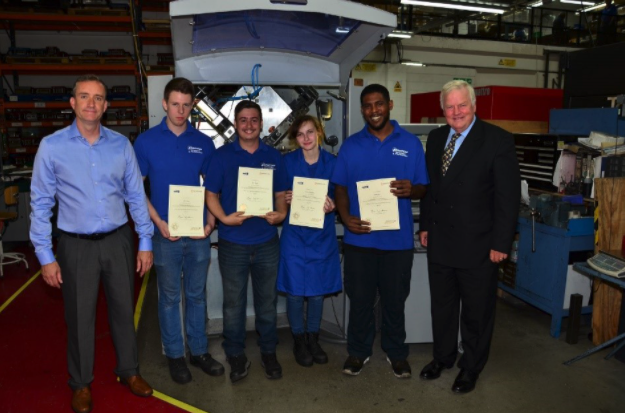How Apprenticeships Could Play A Key Role In Manufacturing’s Recovery
As industry-leading spring manufacturers, investing in the future of manufacturing is important to us. We believe that through apprenticeship schemes, the industry can be positively influenced by the next generation.
In the UK, the manufacturing industry currently supports 2.7 million people in employment and according to a report by CEBR for the National Apprenticeship Service, apprenticeships are forecast to contribute £3.4bn by 2022.
Despite the predictions for growth in manufacturing, it’s true that the industry is facing a skills gap. But with restrictions beginning to ease, we’d like to discuss how apprenticeships could play a pivotal role in ensuring that the manufacturing sector gets back on its feet throughout 2021.
Apprenticeships in Manufacturing
As of 5th February 2020, 76% of manufacturers are currently offering apprenticeships to gain the skills they need and 58% of manufacturers are using their training budget to re-train workers for various roles within their business.
There is also a huge recruitment drive aimed toward younger people, driven by many companies with an ageing workforce. A survey carried out by MAKE UK showed that 80% of manufacturers said the average age of their workforce is 41 or older — this puts a spotlight on a need for skilled young people.
Manufacturing apprentices gain invaluable experience by working with an established employer. This includes an introduction to taking responsibility, accountability, as well as learning trade skills from experienced colleagues.

Why are Apprenticeships Important?
Apprenticeships can introduce a fresh mix of skills, training and technical knowledge to your company. While a lack of technical skills initially is the main driver of recruitment problems, manufacturers continue to provide a platform for apprentices to earn while they learn and build on transferable skills.
The number of annual apprenticeships is predicted to increase across all sectors of the economy over the coming decade, with CEBR forecasting growth from an annual 260,000 in 2012/13 to 480,000 by 2021/22.
Many manufacturers are keen to take on graduates and people with both academic and vocational skills. MAKE UK suggest that “Universities and the wider higher education sector need to be alive to these trends and understand that vocational learners are in high demand from employers and vocational pathways are an attractive offer for young people”.
Apprenticeships at European Springs
In September 2016, we introduced our apprenticeship scheme at our Beckenham site.
Stuart McSheehy, Managing Director (Beckenham) speaks about the importance of modern-day apprenticeships, saying that, “Training a new generation of manufacturing practitioners, offering them the opportunity to gain experience and qualifications in the workplace, establishes a secure foundation for their future, and it’s a part of our work we’re especially proud of.”
Our apprenticeships follow the nationally recognised Mechanical Manufacturing Apprenticeship framework and award certifications in BTEC Level 3 in Engineering Operations and Maintenance, with an accompanying NVQ in Mechanical Manufacturing Engineering.

The Government’s Aims and Apprenticeship Incentive Payments
Provisional figures for the first quarter of the 2020/21 academic year (August to October 2020) show that since May 2015 there have been 2,302,300 apprenticeship starts and since May 2010 this total stands at 4,679,800.
While figures for apprenticeships continue to grow, a concern for future workers choosing an academic path has been highlighted. With this in mind, it’s important to consider that by advertising a structured and paid apprenticeship, you can offer a young person training for their future, on-site experience, as well as the opportunity to learn multiple industry skills.
The government introduced new incentive payments in August to support employers to hire new apprentices. The incentive scheme gives employers who hire apprentices £2,000 for apprentices aged 16 to 24 and £1,500 for apprentices aged 25 and over.
50% of the payment is made 90 days after an apprentice starts in training, and the remaining amount is paid after completion of 365 days of the apprenticeship. The payments for the incentive are subject to the apprentice completing the 90 days and 365 days of the apprenticeship.
The government also launched The Skills Toolkit in April 2020. This has helped many people to build their skills during the coronavirus pandemic and for the future. As of February 2021, the government have reported over 2 million (2,044,300) page views on the skills toolkit website.
We’ve already seen the benefits of having an apprenticeship plan in place and many of our qualified apprentices continue to develop their skills as spring technicians.
By welcoming apprentices every year, we’re strengthening our skillset and introducing more diversity to our business, as well as setting up for future growth and development within the spring industry.
If you’d like to discuss the potential of joining our team or even discuss the possibility of seeking our services then please get in touch with our friendly team.